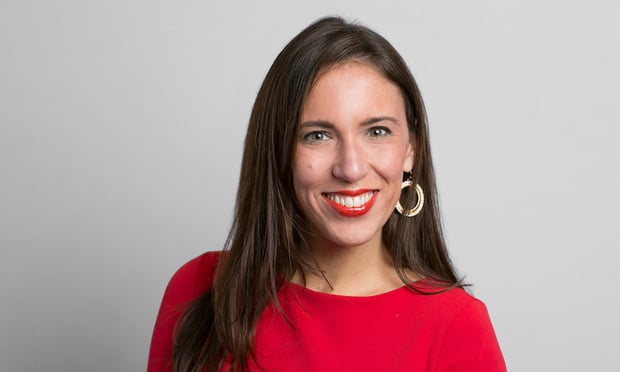From the Editor-in-Chief: Touche Law Firms, Touche
Firms turned up their noses at market pressures in 2017, turning in a banner year with promises for a strong 2018 to follow.
April 24, 2018 at 09:52 AM
4 minute read
 Gina Passarella, Editor-in-Chief of The American Lawyer.
Gina Passarella, Editor-in-Chief of The American Lawyer.
The drumbeat was steady. The observers, myself included, were relentless. External pressures on law firm business models were mounting and firms had to act fast. They just weren't doing enough to meet new market realities—or, for some, to survive.
 Looking to buy the report or leverage the Am Law 100 data with powerful data visualizations and expert analysis? Access Premium Content
Looking to buy the report or leverage the Am Law 100 data with powerful data visualizations and expert analysis? Access Premium ContentMaybe they listened. Maybe they had enough of the talk. But something happened in 2017, particularly in the second half of the year, that spurred law firms to post their best gains in about a decade. Perhaps a proverbial middle finger to the critics? Perhaps the critics were dead wrong? Perhaps the industry is turning a corner that no one saw coming? Or perhaps our definitions of success have shifted in a decade?
Yes it's true that the top firms continued to outperform those lower on ouér annual list of the Am Law 100, but even firms in the second half of the ranking showed strong performances across key financial metrics. Demand was up, rate increases were slightly easier to push through. The economy was good to firms in 2017, even if clients were still tight with purse strings and doled out pieces of their work to alternative legal services providers. I heard more and more about clients pushing to return to fewer firms for work, rather than disaggregation.
Observers are split on just how long law firms will be able to look down their noses at the critics. The data reveals complicated questions as much as it provides answers on the state of the market.
There is a sentiment among some I've spoken with that these increases are good for 2018, but wouldn't have been deemed so in 2007. There is a sense for some that the market factors everyone has been warning about—clients handling more work themselves, ASPs entering the market in greater force, the Big Four, accelerating commoditization and overcapacity—are still looming and haven't made their full impact just yet. And, of course, there must be a downturn coming soon.
But others have come to the defense of firms, noting that they simply are much better managed than they were 10 years ago. The economy is humming along nicely. And as one observer notes in our articles this month, firms may feel more emboldened to raise rates this year after doing so well in 2017. He says the pendulum is swinging away from general counsel, who, he says, protested too much. Wow. That's a different tune than we've heard for the last decade.
My take? Granted, this is from one of those observers who may have just had it all wrong last year. I think the economy is helping firms stay strong. I think we may see a slightly different picture for the Am Law Second Hundred (I'll wait to eat my words until that issue publishes in June). And I think I hear a lot of the same comments from a lot of law firms, all trying to do the same things. It's that part that has me worried. I have long expressed concern about overcapacity within an individual firm, but maybe the bigger overcapacity issue is in each market segment. How many elite New York firms are needed? How many global elite firms can survive? How much room is there in the market for dozens of international business firms? You get the idea.
But, lest I continue my tryout for SNL's latest Debbie Downer, let me raise my glass to the Am Law 100, which undoubtedly worked their tails off to generate a stellar year. To 2018, and beyond!
This content has been archived. It is available through our partners, LexisNexis® and Bloomberg Law.
To view this content, please continue to their sites.
Not a Lexis Subscriber?
Subscribe Now
Not a Bloomberg Law Subscriber?
Subscribe Now
NOT FOR REPRINT
© 2025 ALM Global, LLC, All Rights Reserved. Request academic re-use from www.copyright.com. All other uses, submit a request to [email protected]. For more information visit Asset & Logo Licensing.
You Might Like
View All
From the (Departing) Editor-in-Chief: Thank You From The Bottom of My Heart
5 minute read
Despite the Effort, Structural Blockers, Not Ennui, Stall Law Firm Diversity Efforts
4 minute read
Trending Stories
- 1With New Civil Jury Selection Rule, Litigants Should Carefully Weigh Waiver Risks
- 2Young Lawyers Become Old(er) Lawyers
- 3Caught In the In Between: A Legal Roadmap for the Sandwich Generation
- 4Top 10 Developments, Lessons, and Reminders of 2024
- 5Gift and Estate Tax Opportunities and Potential Traps in 2025 for Our New York High Net Worth Clients
Who Got The Work
J. Brugh Lower of Gibbons has entered an appearance for industrial equipment supplier Devco Corporation in a pending trademark infringement lawsuit. The suit, accusing the defendant of selling knock-off Graco products, was filed Dec. 18 in New Jersey District Court by Rivkin Radler on behalf of Graco Inc. and Graco Minnesota. The case, assigned to U.S. District Judge Zahid N. Quraishi, is 3:24-cv-11294, Graco Inc. et al v. Devco Corporation.
Who Got The Work
Rebecca Maller-Stein and Kent A. Yalowitz of Arnold & Porter Kaye Scholer have entered their appearances for Hanaco Venture Capital and its executives, Lior Prosor and David Frankel, in a pending securities lawsuit. The action, filed on Dec. 24 in New York Southern District Court by Zell, Aron & Co. on behalf of Goldeneye Advisors, accuses the defendants of negligently and fraudulently managing the plaintiff's $1 million investment. The case, assigned to U.S. District Judge Vernon S. Broderick, is 1:24-cv-09918, Goldeneye Advisors, LLC v. Hanaco Venture Capital, Ltd. et al.
Who Got The Work
Attorneys from A&O Shearman has stepped in as defense counsel for Toronto-Dominion Bank and other defendants in a pending securities class action. The suit, filed Dec. 11 in New York Southern District Court by Bleichmar Fonti & Auld, accuses the defendants of concealing the bank's 'pervasive' deficiencies in regards to its compliance with the Bank Secrecy Act and the quality of its anti-money laundering controls. The case, assigned to U.S. District Judge Arun Subramanian, is 1:24-cv-09445, Gonzalez v. The Toronto-Dominion Bank et al.
Who Got The Work
Crown Castle International, a Pennsylvania company providing shared communications infrastructure, has turned to Luke D. Wolf of Gordon Rees Scully Mansukhani to fend off a pending breach-of-contract lawsuit. The court action, filed Nov. 25 in Michigan Eastern District Court by Hooper Hathaway PC on behalf of The Town Residences LLC, accuses Crown Castle of failing to transfer approximately $30,000 in utility payments from T-Mobile in breach of a roof-top lease and assignment agreement. The case, assigned to U.S. District Judge Susan K. Declercq, is 2:24-cv-13131, The Town Residences LLC v. T-Mobile US, Inc. et al.
Who Got The Work
Wilfred P. Coronato and Daniel M. Schwartz of McCarter & English have stepped in as defense counsel to Electrolux Home Products Inc. in a pending product liability lawsuit. The court action, filed Nov. 26 in New York Eastern District Court by Poulos Lopiccolo PC and Nagel Rice LLP on behalf of David Stern, alleges that the defendant's refrigerators’ drawers and shelving repeatedly break and fall apart within months after purchase. The case, assigned to U.S. District Judge Joan M. Azrack, is 2:24-cv-08204, Stern v. Electrolux Home Products, Inc.
Featured Firms
Law Offices of Gary Martin Hays & Associates, P.C.
(470) 294-1674
Law Offices of Mark E. Salomone
(857) 444-6468
Smith & Hassler
(713) 739-1250










